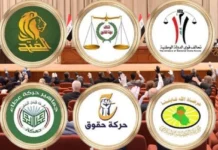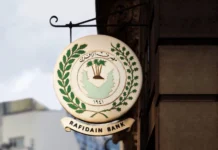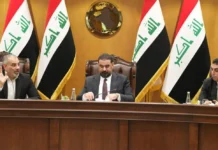Tishwash: Al-Ghariri: Iraq’s negotiations to join the World Trade Organization are ongoing.
Minister of Trade Athir Dawood Al-Ghurairi confirmed on Monday that Iraq’s negotiations to join the World Trade Organization are ongoing, while pointing out that regional cooperation and integration are the way to achieve peace, stability and sustainable development.
A statement by the Ministry of Trade received by the Iraqi News Agency (INA) stated that “Minister of Trade Athir Dawood Al-Ghurairi participated in the 16th session of the United Nations Conference on Trade and Development (UNCTAD), held in Geneva with the wide participation of representatives of countries and international and regional organizations.”
The minister stressed, according to the statement, that “collective action and regional integration represent a fundamental pillar for building a more stable and equitable economic system in light of the transformations and challenges witnessed by the world,” stressing that “open regional agreements can support the multilateral trading system and promote sustainable development.”
Al-Ghurairi indicated that “Iraq, which continues its negotiations to join the World Trade Organization, sees regional initiatives as an opportunity to enhance its institutional readiness and align its legislative and investment frameworks, enabling it to effectively integrate into the global economy.”
He explained that “regional integration represents a pillar for development and reconstruction, and that cooperation in the areas of infrastructure, simplifying customs procedures, encouraging investment, energy, agriculture, and services contributes to enhancing competitiveness and diversifying the national economy.”
At the end of his speech, the Minister praised UNCTAD’s significant role in supporting Iraq during its accession to the World Trade Organization, stressing that “regional cooperation and integration are the path to achieving peace, stability, and sustainable development.” link
************
Tishwash: Energy expert: 70% of the articles of the oil and gas law have been agreed upon
An oil and gas expert says that 70% of the articles of the oil and gas law have been agreed upon and the rest needs political dialogue and negotiations.
The big picture: The oil and gas law was supposed to be completed in 2007 and voted on in the Iraqi parliament, but due to conflict and indifference of Iraqi parties, year after year, the enactment of the law was hampered.
Official Statement: د. Govand Sherwani, a university professor and oil and gas expert, told AVA that the oil export agreement will help to pass the oil and gas law in the sixth session of the Iraqi parliament, provided there is no political interference.
Sherwani said the biggest problem between Erbil and Baghdad on the oil issue is the failure to pass the oil and gas law, which should have been passed in 2007, but fortunately 70% of the articles of the draft law have been agreed.
On the other hand, the expert said that the three-year Iraqi budget law contains many shortcomings and all to the detriment of the Kurdistan Region, if the technical and financial issues are corrected, there is an opportunity in the 2026 budget law. link
************
Tishwash: Central Bank: Iraq’s public debt is lower than that of the United States and several other Arab countries.
The Central Bank of Iraq confirmed on Monday that the external debt curve is declining and that Iraq is within safe limits for public debt. The bank noted that Iraq’s public debt-to-GDP ratio stands at 31%, a lower percentage than that of developed countries such as the United States and Japan, and other Arab countries such as Egypt, Algeria, and Morocco.
Samir Fakhri, Director General of the Statistics and Research Department at the Central Bank, said, “Total public debt is divided into domestic and external debt. Domestic debt, as of the end of last September, amounted to 90.6 trillion dinars.”
He added, “The domestic debt is divided into more than 50% in favor of the Central Bank, and less than 50% in favor of banks, whether private or government-owned,” indicating that “the majority of the debt owed to banks is owed to government-owned banks, i.e., from government to government.”
He pointed out that “the external debt has reached $54 billion, and is divided into three parts: the largest part, namely $40.5 billion, dates back to before 2003. It is a suspended debt, and we are not currently bearing any burdens on it, whether interest or debt service, from 2003 until today.”
He continued, “The second part is the Paris Club debt, which amounted to $120 billion, 80% of which has been written off, leaving $24 billion. With what Iraq has paid, only $3.8 billion remains, which was supposed to be covered until the end of 2028.” We note here that the external debt curve is declining.
He pointed out that “the third portion amounts to approximately $10 billion, and is related to investment spending. It is a long-term debt of twenty years, owed to a group of countries and organizations, including Japan’s JICA, Germany’s Siemens, Spain, and Britain. Thus, the total debt amounts to approximately $10 billion. If we exclude the forty and a half billion, the remaining amount is approximately $13 billion.”
He emphasized that “if we convert these debts into dollars multiplied by the current exchange rate and add them to the domestic debt, the total debt-to-GDP ratio would reach approximately 43%. However, if we exclude the suspended debt of $40 billion, the public debt ratio would be around 30 to 31% of GDP.”
Regarding financing the three-year budget deficit, Fakhri explained that “the deficit within the budget law was approved by Parliament for a period of three years. It is a planned deficit, not an actual one, of approximately 64 trillion dinars per year, meaning a total of 192 trillion dinars for the three years. What was actually spent as real debt is approximately 35 trillion dinars.” He indicated that “if we divide 35 trillion by the planned deficit, the percentage will be approximately 18.2%,” noting that “the debt was 56 trillion dinars until the end of 2022, and from 2022 until today, 35 trillion has been added to it, bringing the total to approximately 90.6 trillion dinars that we mentioned.”
He added, “One of the most important indicators of monetary policy is the consumer price index (inflation), which is currently close to zero. If we compare it with neighboring countries like Iran and Turkey, we find a clear difference in inflation rates between them and Iraq, in addition to the exchange rate gap.”
He stressed that “the focus must be on financing the deficit, so it must be directed towards investment spending, as this leads to growth in non-oil revenues.”
Fakhry touched on some of the debt ratios in neighboring countries, noting that “in Egypt, public debt amounts to 90% of GDP, in Algeria: 49%, in Morocco: 70%, in Lebanon: 160-170%, and in Saudi Arabia: 29%, despite being a strong and industrially advanced economy.”
He pointed out that “major industrialized countries, such as the United States, have a public debt of 120%, while Japan’s debt ratio is 250%.” link





